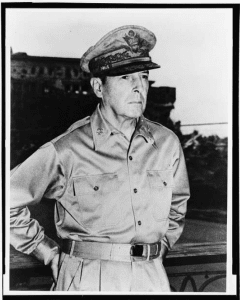General Douglas MacArthur, a five-star American military leader, was a figure of legendary proportions in the annals of history. Known for his strategic brilliance, unyielding determination, and eloquence, General MacArthur’s legacy continues to inspire generations.

I. Early Career and World War I:
General MacArthur’s journey in the military began when he graduated from the United States Military Academy at West Point in 1903. His impressive leadership during World War I earned him accolades as he served as the chief of staff of the 42nd Division and later as a brigadier general in the renowned Rainbow Division. His exceptional performance during the Meuse-Argonne Offensive garnered him praise and set the foundation for his illustrious career.
II. World War II and “I Shall Return”:
World War II would become the defining moment of General MacArthur’s career. Commanding U.S. forces in the Pacific theater, he played pivotal roles in the defense of the Philippines, the Battle of Bataan, and the Battle of Corregidor. After the fall of the Philippines to Japanese forces, General MacArthur vowed, “I shall return.” True to his word, in 1944, he led the Allied forces in the liberation of the Philippines, solidifying his place as a legendary military leader.
III. Supreme Commander for the Allied Powers:
Following World War II, General MacArthur was appointed as the Supreme Commander for the Allied Powers (SCAP) in Japan. His leadership during the occupation and reconstruction of Japan was instrumental in implementing reforms that contributed significantly to the country’s post-war recovery and democratization. His expertise and vision guided Japan toward a new era of peace and progress.
IV. The Korean War and Controversial Dismissal:
In 1950, during the Korean War, General MacArthur assumed command of the United Nations forces in Korea. His masterful Inchon landing dealt a severe blow to North Korean forces. However, as the war unfolded, General MacArthur’s aggressive approach and advocacy for expanding the conflict into China led to a rift with President Harry S. Truman. In 1951, Truman relieved him of his command for insubordination, creating controversy that echoes to this day.
V. Legacy and Impact:
Despite the contentious conclusion of his military career, General MacArthur’s legacy endures. His unwavering commitment to duty, strategic genius, and inspirational leadership have left an indelible mark on the United States and the world. His famous “Old Soldiers Never Die, They Just Fade Away” speech before Congress in 1951 resonates with people worldwide, serving as a reminder of his unwavering spirit and dedication.
General Douglas MacArthur’s life is a testament to the transformative power of leadership and determination. His brilliance in battle, his dedication to duty, and his unwavering commitment to the principles he upheld have solidified his place as one of history’s greatest military leaders. General MacArthur’s name will forever be etched in the annals of military history, inspiring generations to come to uphold the values of honor, courage, and perseverance.
Cite This Article
"General MacArthur: A Legendary Military Leader" History on the Net© 2000-2024, Salem Media.
April 28, 2024 <https://www.historyonthenet.com/general-macarthur-a-legendary-military-leader>
More Citation Information.
